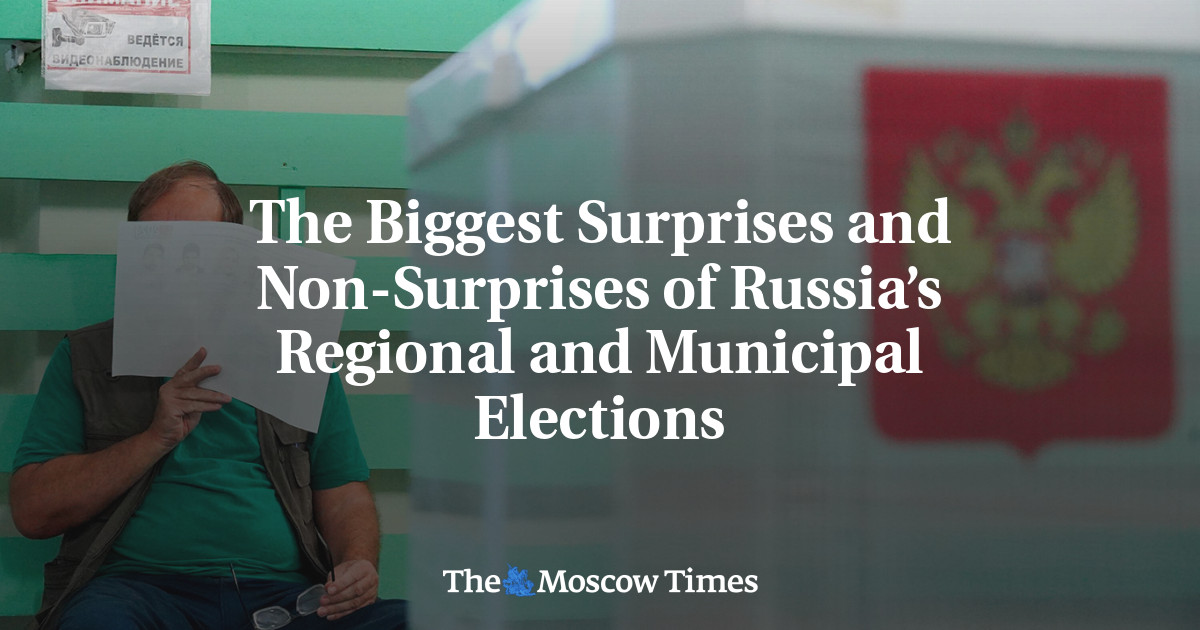
Russia’s 2024 regional and municipal elections ended in few surprises, with the ruling, pro-Kremlin United Russia party solidifying its control in over 4,000 races nationwide, including in occupied Ukrainian territories.
With the invasion of Ukraine in its third year, the Kremlin effectively banned any independent opposition candidates and thinned out the list of Kremlin-approved candidates allowed onto the ballot at all levels, from State Duma elections to local municipalities.
Here is a roundup of some of the most noteworthy outcomes from the elections:
Unpopular governors win by record margins
All incumbent governors and regional heads won re-election with an average of about 80%. Kurgan region Governor Vadim Shumkov won the highest margin with a record 85.17%.
None of them, however, received a higher margin than President Vladimir Putin won in the March presidential election — 87.27%.
The Kremlin — which keeps a low profile by relying on loyal officials, both in the capital and on the ground, to closely monitor every step of the election campaign — took care to ensure that no governor received a higher percentage of the vote than Putin, The Moscow Times understands, as this is considered mauvais ton and could even result in punishment for the governors.
The governors’ record-high results were hardly a true reflection of widespread public support.
Radiy Khabirov, the head of the Urals republic of Bashkortostan whose quest for reelection was marred by corruption scandals and echoes of some of the largest public unrest in wartime Russia, secured 80.21% of votes, according to official records.
But the real share of votes for Khabirov is unlikely to exceed 40%, according to independent election analyst Renat Fakiev.
“The number [of votes given] for Khabibrov was exaggerated by approximately two times. Moreover, there were polling stations in some cities where he lost to the Communist [Party candidate],” Fakiev told local news outlet Aspekty.
Fakiev believes that Khabirov would have to face Communist Party candidate Artur Shainurov in a runoff in case of a fair election, though CEC numbers currently suggest that Shainurov received only 6.95% of votes.
St. Petersburg Governor Alexander Beglov won re-election with 59.34% of the vote, the lowest margin of victory for an incumbent governor in the entire country.
Having developed a reputation for incompetence since being appointed governor in 2018, United Russia member Beglov nonetheless ran virtually unopposed thanks to mechanisms designed to keep real competitors off the ballot.
Bratsk mayor
In the Siberian city of Bratsk — one of the only Russian cities where the mayor is still elected by voters — Alexander Dubrovin ousted longtime Mayor Sergei Serebrennikov with 70% of the vote.
Serebrennikov, United Russia’s nominee in the race, had led Bratsk since 2014.
But though Dubrovin was elected as an independent candidate, he reinstated his membership in United Russia as soon as the election was over.
The only real opposition candidate, Communist Party-backed blogger Elena Kutergina, was barred from the ballot.
The Bratsk mayoral election was a unique case for the Kremlin, which almost never runs two candidates representing United Russia in a single race. Even though the Serebrennikov lost, he was defeated by Dubrovin, another Kremlin candidate — allowing United Russia to hang onto its position without handing a victory to the “systemic” opposition.
Ukraine war veterans
Over 300 veterans of the war in Ukraine who ran as United Russia candidates were elected to office in this weekend’s elections, state media reported Monday, citing a senior United Russia official.
Vladimir Yakushev, acting secretary of United Russia’s general council, told the TASS news agency that 308 war veteran candidates won in races at the local and regional levels. Overall, 380 war veterans ran for office.
With hundreds of thousands of Russian men on the front lines and over 64,000 confirmed dead or wounded (according to an independent tally by the BBC and Mediazona), it is crucial for the Kremlin to show the public that these men are starting to play a role in Russian politics and state management.
Putin has repeatedly emphasized this, referring to the military involved in the Ukraine invasion as the “new, true elite” of Russia. The Kremlin highlighted this message during Putin’s presidential campaign in March. A lack of sufficient military personnel on candidate lists for various elections may have contributed to the sudden resignation of Andrei Turchak, former head of the ruling United Russia party and son of a longtime Putin ally, a move that was seen as a punishment.
However, none of the regular participants in the invasion were given meaningful roles, and the inclusion of 308 war veterans in political lists is not seen as significant.





